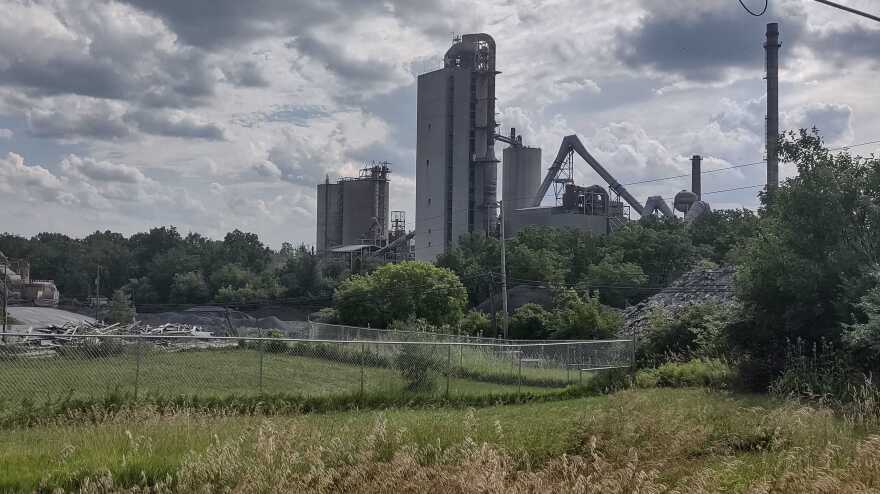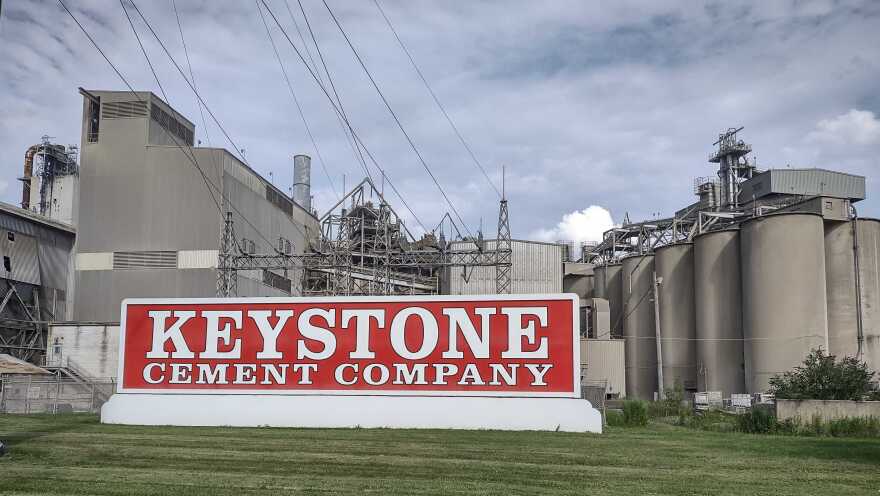EAST ALLEN TWP., Pa. — Officials at a Northampton County industrial facility want to change the way they transport hazardous waste through the Lehigh Valley.
Instead of hauling bulk shipments in tanker trucks via roads and highways, officials are seeking permission from the state to bring in hazardous waste via railcar.
“Switching to rail transport removes approximately four trucks from the roads for every one railcar, reducing road traffic and associated risks,” said Stephen P. Holt, vice president of environmental, health and safety for Keystone Cement Co. “Additionally, rail transport is statistically safer than road transport by a significant margin.”
The cement company, off Route 987 just south of Bath, burns hazardous waste as a fuel source for its kiln.
Keystone, owned by Texas-based company Giant Cement Holding Inc., is renewing its hazardous waste permit with the state Department of Environmental Protection. It’s a fairly regular process for industrial facilities dealing with hazardous waste that occurs each decade after an initial permit is granted.
However, this round’s change from road to rail isn’t sitting well with some of the Valley’s environmental advocates, especially considering the company last year was named one of the commonwealth’s top climate polluters.
And, residents remember fines levied against the company for air pollution, as well as an incident in the late 1990s, when a hazardous waste fuel tank overheated and 1,600 nearby residents were temporarily evacuated.
Then, there’s the recent train derailments in March and earlier this month in Lower Saucon Township and under the Hill-to-Hill Bridge in South Bethlehem, respectively.
The public comment period on the draft permit, which began June 22, runs through Aug. 6. There is no public hearing scheduled.
Comments on the draft permit can be submitted to the state Department of Environmental Protection, Bureau of Waste Management, 2 Public Square, Wilkes-Barre PA 18701-1915, Attention: Roger Bellas, regional solid waste manager.
Comments should include all reasonably available references, factual grounds and supporting material, officials said.
LehighValleyNews.com reached out to several area environmental groups and officials for comment on this story. Some did not respond, while others said they weren’t aware the permit renewal process was underway, nor that the public comment period was open.
Some concerned residents have already, or plan to, submit written comments, but declined to be interviewed for this story.
Our efforts in energy recovery fuel contribute to a more environmentally friendly operation at the plant compared to burning fossil fuels.Stephen P. Holt, vice president of environmental, health and safety for Keystone Cement Co.
The renewal process is “a continuation of our longstanding compliance with regulatory requirements,” Holt said, adding, “Our efforts in energy recovery fuel contribute to a more environmentally friendly operation at the plant compared to burning fossil fuels.”
Hazardous waste management in Pa.
The commonwealth’s hazardous waste permitting process affords both state environmental officials and residents the opportunity to review draft materials. Residents can receive copies by requesting them through the state Department of Environmental Protection.
The renewal permit materials available for public review, dated June 7, is just shy of 60 pages. It includes a site description, the draft permit contents, a fact sheet and more.
Keystone was first issued a hazardous waste management permit in December 1991. The company “utilizes hazardous and non-hazardous waste derived fuels, in addition to virgin fossil fuels, to fire its rotary kiln, and is subject to [the Resource Conservation and Recovery Act] permit requirements associated with the storage, blending and processing of hazardous waste derived fuels,” according to the draft, obtained by LehighValleyNews.com through a request to the state DEP.
The Resource Conservation and Recovery Act, also known as RCRA and enacted in the mid-1970s, is a federal law governing the disposal of solid and hazardous waste. The state DEP also publishes a “Hazardous Waste Regulation Compliance Guideline.”
Keystone’s current hazardous waste management permit expired in July 2019, according to the draft permit. The DEP received a renewal application the previous August; the application was revised in June of 2020 and December of 2022.
Company officials are currently operating the facility under an administrative extension.
If approved, the permit would allow Keystone to install “a new hazardous waste fuels tank farm, railcar loading/unloading facility and mixing system,” according to the draft.

Roads vs. rails
Currently, hazardous waste is delivered to Keystone in bulk tanker truck shipments. It’s then stored in one of four waste-derived fuel tanks at the facility — two 15,000-gallon capacity tanks and two 31,500-gallon capacity tanks.
The draft includes “interim” and “final” operating scenarios. The former allows the company to phase in the installation of six new tanks in a new tank farm area, but not to exceed existing permitted capacity.
The latter permits Keystone to “install and operate a new mixing system, new railcar unloading/loading facility including a 30,000-gallon tank, direct transfer operations and six new tanks identified in the Interim Operating Scenario.”
Asked about environmental concerns raised by residents, Holt sent a statement to LehighValleyNews.com addressing seven different areas, from environmental impact and transportation necessity to regulatory compliance and contingency plans.
“It is important to note that all hazardous materials are 100% destroyed in the kiln, and the resulting non-hazardous ashes are integrated back into the kiln process,” he said. “Keystone is subject to the most stringent air regulations under the United States Clean Air Act, Maximum Achievable Control Technology Standards.
“In addition, Keystone is subject to stringent [National Pollutant Discharge Elimination System] water regulations and monitors the Monocacy Creek.”
A National Pollutant Discharge Elimination System, or NPDES, permit is required for any “point source discharge to waters” across the state, according to the DEP’s website.
The DEP in April held a public hearing in Bethlehem to collect public comment on a NPDES permit for a Hanover Township, Northampton County, warehouse project, also linked to the Monocacy Creek.
“Both fuel and waste fuel must be transported for cement industries and the majority of other industries,” Holt said. “While we do not transport these materials ourselves, our processes adhere strictly to regulatory requirements.”
He cited a U.S. Department of Transportation statistic that there are approximately 1 million shipments of hazardous materials every day in the U.S., adding the “Pipeline and Hazardous Materials Safety Administration (PHMSA) ensures these shipments are conducted safely.”
Rail transportation of hazardous materials in the United States is recognized to be the safest land-based method of moving large quantities of chemicals over long distances.Federal Railroad Commission
“Rail transportation of hazardous materials in the United States is recognized to be the safest land-based method of moving large quantities of chemicals over long distances,” according to the website for the Federal Railroad Commission, part of the U.S. DOT. “Recent statistics show that the rail industry's safety performance, as a whole, is improving.
“In particular, the vast majority of hazardous materials shipped by rail tank car every year arrive safely and without incident, and railroads generally have an outstanding record in moving shipments of hazardous materials safely.”
Residents can use PHMSA’s “Hazmat Incident Report Search Tool” to find incidents recorded nationwide.
“We comply with all EPA and other regulatory standards,” Holt said. “Our operations are conducted with the highest regard for safety and environmental protection.
“… Despite the higher safety of rail transport, we have a comprehensive spill, recovery and response plan in place at our plants, aligned with regulatory requirements, in addition we annually invite first responders to our site for drills and familiarity with our operations.”


